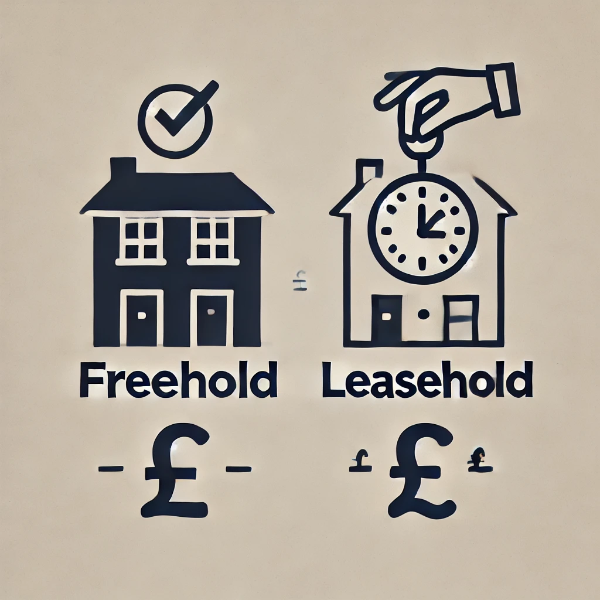Freehold or Leasehold: What Property Investors Need to Know
Negotiating the UK's real estate investment environment requires a firm grasp of the contrast between the two ownership types. Each presents unique conditions and advantages that significantly impact investment strategies. This comprehensive guide unpacks these distinctions, furnishing investors with the insights needed to make informed and strategic decisions.
Unpacking Property Ownership: Leasehold vs. Freehold
Ownership in the UK property market can be divided into two main forms—leasehold and freehold—each with distinct qualities, financial responsibilities, and legal intricacies that investors should be familiar with.
Freehold: The Basics
Freehold ownership ensures full possession of both the property and the land, offering the owner unrestricted control over its use and modifications within the bounds of local regulations.
Advantages:
- Complete Autonomy: Owners have the freedom to alter their property according to their plans without needing approvals beyond local planning permission.
- No Recurring Fees: There are no ongoing ground rent or service charge obligations, simplifying financial planning.
- Enduring Ownership: offering distinct generational value.
- Potential Value Increase: Historically, freehold properties tend to be increasingly worth more.
Disadvantages:
- Higher Acquisition Price: Freehold usually involves a larger financial outlay.
- Maintenance Responsibilities: Owners bear full responsibility for the upkeep and repair of the property.
Leasehold: The Essentials
Leasehold ownership grants the right to use a property - Lease durations commonly range from 99 to 999 years.
Advantages:
- Less expensive: More within reach for many as investment options.
- Shared Maintenance: Service charges cover maintenance of communal areas, reducing individual maintenance responsibilities.
Disadvantages:
- Ongoing Fees: Obligations to pay ground rent and service charges can affect the profitability of an investment.
- Limited Control: Significant alterations usually require freeholder approval.
- Asset Depreciation: Diminishing lease terms can reduce a property's value and buyer appeal.

Legal and Financial Considerations
Navigating the legal framework and financial commitments tied to each ownership type is critical for investors aiming to capitalise on property investments.
Lease Extensions
Properties with shorter lease durations become less attractive to both buyers and lenders. In Law (*1) there are provisions that allow qualifying leaseholders to extend their leases, thus preserving or enhancing property value.
Cost Considerations for Lease Extensions:
- Premium Payments: Determined by the property's market value, current ground rent, and remaining lease length.
- Legal and Valuation Fees: Professional services are needed to ensure a fair and accurate valuation and extension process.
Enfranchisement
Collective enfranchisement allows leaseholders to purchase the freehold of their building, providing greater security and control over property use and management.
Essentials of Enfranchisement:
- Participation Requirement: A majority of leaseholders in the building must agree to pursue freehold purchase.
- Financial Commitment: Obtaining the freehold entails substantial costs and requires coordinated legal efforts.
Ground Rent Reforms
In response to criticisms of unfair ground rent increases, the Leasehold Reform (Ground Rent) Act 2022(*2) reduces ground rents on new leases to a nominal "peppercorn" amount, reducing financial burdens for future leaseholders.
Market Trends and Economic Impacts
The UK's real estate market is continually shaped by legislative changes and broader economic conditions, influencing the desirability and returns of leasehold and freehold properties.
The Rise of Freehold
Freehold properties have become increasingly popular due to their autonomy, permanence, and fewer legal constraints - factors that have become more desirable amid dissatisfaction with historical leasehold practices.
Urban Leasehold Appeal
Given the limited availability and high costs of land in urban centers, leasehold properties in these locations remain attractive, especially under new regulations aimed at enhancing lease conditions and protecting leaseholders.
Economic Influences
Economic events, such as Brexit, have introduced uncertainty into the market, impacting currency rates and investor sentiments. However, areas with robust local economies and infrastructure investment retain their attractiveness, offering prime opportunities for growth.
Seeking Professional Guidance
Investors should leverage the expertise of property lawyers, financial consultants, and real estate professionals to help them steer through the complexities of property ownership in the UK.
Questions for Advisors:
- Legal Framework: How do current laws and regulations affect my potential investment?
- Property Evaluation: What are the particular advantages or risks associated with properties in specific local markets?
- Registering Early: Early registrations ensure smooth participation.
- Investment Risks:How can potential legal and financial risks be mitigated?
Local Market Evaluations
Things can vary significantly by region. For example, leasehold properties may hold more appeal in London, where high property prices limit access to freehold options.
